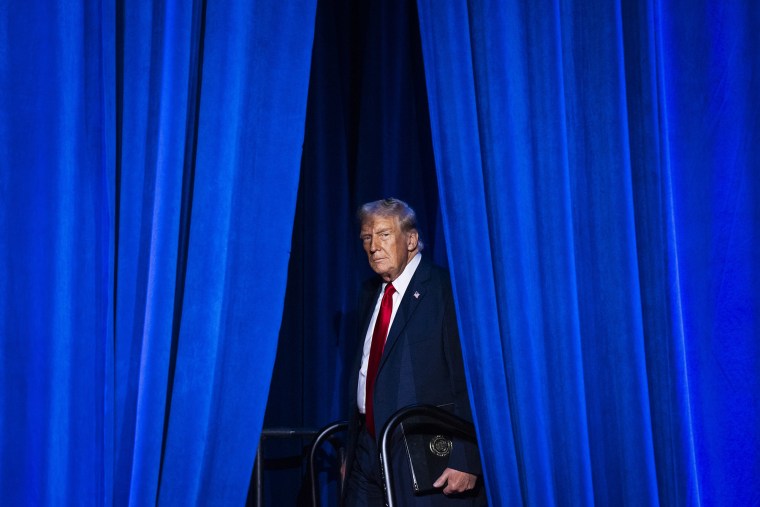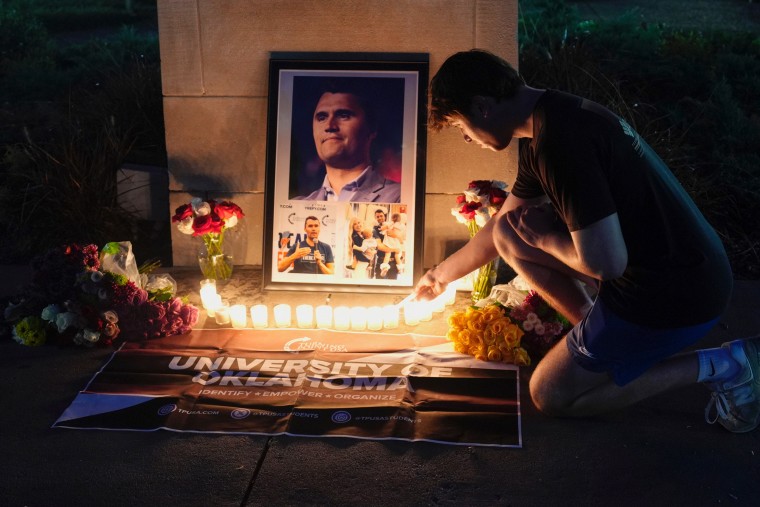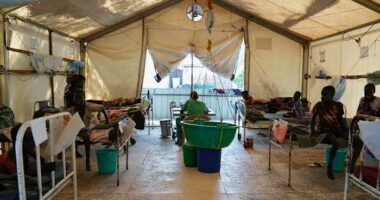Share this @internewscast.com
Following the assassination of Charlie Kirk, President Donald Trump and his supporters have warned of utilizing federal authority against what they describe as the “radical left.”
“It is a vast domestic terror movement,” Stephen Miller, Trump’s top policy adviser, said Monday.
“With God as my witness, we will harness every resource at the Department of Justice, Homeland Security, and throughout the government to identify, disrupt, dismantle, and destroy these networks to make America safe for its citizens again,” he stated. “It will be accomplished, and we will do it in Charlie’s honor.”
However, the claim that a secretive network of violent left-wing extremists orchestrated the murder contradicts the evidence shared by law enforcement on Tuesday in Utah, where Kirk was shot. There is no indication from Tuesday’s presentation that the suspect, Tyler Robinson, was affiliated with a group or influenced by a specific leader. The investigation remains ongoing.
Utah County Attorney Jeffrey Gray presented seven charges, including aggravated murder, against Robinson, backed by evidence in a 10-page court document. After the shooting, both Robinson’s father and his roommate inquired about his motive. Robinson reportedly said that Kirk “spreads too much hate” and expressed he was “fed up with his hatred,” according to the documents.
Experts have told NBC News that the Trump administration seems to be using Kirk’s assassination as a pretext to target left-wing individuals and groups. While officials have not yet elaborated on their plans, remarks by Stephen Miller and others prompt questions about who would be targeted, the methods employed, and the implications for political dissent.
“When I hear terms like disrupt, dismantle, and destroy these networks, the question arises — Is it a criminal network plotting crimes?” said Anthony Cangelosi, a former agent with the Secret Service and Department of Homeland Security. “If they are, then by all means, disrupt and dismantle them. We don’t disrupt or dismantle organizations merely because we disagree with them.”
Trump swept into office in January vowing to exact revenge on his perceived enemies. His administration has already taken action against universities, law firms, prominent Democrats and FBI agents who worked on the Jan. 6 investigations, to name a few.

But a new crackdown along the lines of what Miller has proposed is raising fears among some civil liberties groups and political experts that the administration is ramping up its efforts to punish or silence critics.
“The administration’s signaling that it intends to use the assassination of Charlie Kirk as justification for targeting the political left is the least surprising outcome of this tragedy, ” said David Viola, a professor at John Jay College in New York and author of “You Have Unleashed a Storm,” a new book on political violence during the 1960s.
He noted that the move has “scary echoes in our not too distant past,” referencing the actions of the FBI under J. Edgar Hoover to target left-leaning groups and figures like Martin Luther King.
“The truth is, we have a crisis of political violence in the United States today — not a crisis of ‘radical left’ political violence or ‘radical right’ political violence,” Viola added. “Amplifying one aspect of the crisis while pretending the other doesn’t exist will only cause the spiral to worsen.”
Since 2002, right-wing ideologies have fueled more than 70% of all extremist attacks and domestic terror plots in the U.S., according to the Anti-Defamation League.
The Justice Department itself noted in a 2024 study that the number of far-right attacks in the U.S. continues to outpace all other types of terrorism and domestic violent extremism. The study was removed from the Justice Department website in the past few days, according to 404 Media.
The Justice Department did not respond to a request for comment about the removal of the study or the details of its plan to target left-wing groups.
Abigail Jackson, a White House spokeswoman, said left-wing organizations have “fueled violent riots, organized attacks against law enforcement officers, coordinated illegal doxing campaigns, arranged drop points for weapons and riot materials, and more.”
“The Trump administration will get to the bottom of this vast network inciting violence in American communities,” Jackson added. “This effort will target those committing criminal acts and hold them accountable.”
The killing of Kirk, a hugely popular conservative activist who is credited with helping Trump win the 2024 election, has convulsed an already deeply polarized America.

Kirk built a massive following, particularly among young Republicans, who flocked to his events on college campuses where he engaged in live debates with students. He was a divisive figure who also drew sharp criticism for statements considered racist, misogynistic, Islamophobic, antisemitic and against transgender people.
Robinson grew up in a conservative family in southwestern Utah but had developed political leanings that reflected a “leftist ideology,” Utah governor Spencer Cox said over the weekend, without elaborating.
Court records on Tuesday noted that Robinson and his father had “very different political views.” His mother told investigators “that over the last year or so, Robinson had become more political and had started to lean more to the left — becoming more pro-gay and trans-rights oriented. She stated that Robinson began to date his roommate, a biological male who was transitioning genders.”
The roommate is cooperating with authorities, and text messages detailed in court documents show the person was shocked by Kirk’s killing.
Robinson was charged in part for targeting Kirk’s “political expression,” prosecutors said, without describing any specific ideology. Robinson wrote messages on bullet casings that references fascism, video gaming and internet meme culture.
Kirk’s assassination at Utah Valley University marked the latest in a string of targeted attacks against prominent figures on both sides of the political divide.
It came nearly three months after a gunman killed former Minnesota House Speaker Melissa Hortman, a Democrat, and her husband, and injured State Sen. John Hoffman, also a Democrat, and his wife. Two months earlier, the residence of Pennsylvania Gov. Josh Shapiro’, a Democrat, was set on fire by a man who suggested he was upset by the governor’s position on the Israeli-Palestinian conflict.
In the 2024 presidential campaign, Trump narrowly survived an assassination attempt during a rally in Butler, Pennsylvania. Two months later, Secret Service agents apprehended a gunman lying in wait for Trump on his golf course in Florida. He is currently on trial.
The Biden administration poured resources into combatting the threat of domestic violent extremism.
The Trump administration has shifted FBI agents and others to focus on immigration and other priorities. Trump also pardoned those who participated in the Capitol riot on Jan. 6, 2021.
“It’s really hard to take this seriously when all the people who attacked the Capitol were pardoned,” said Daniel Richman, professor of law at Columbia University and a former federal prosecutor in the U.S. Attorney’s Office for the Southern District of New York.
Richman said it would be difficult for the Trump administration to carry out the type of sweeping crackdown on what it calls left-wing organizations. “It’s very hard to get it right when, on the one hand, you’re recognizing First Amendment rights and, on the other, recognizing that sometimes people act on their threats.”
The cases that get prosecuted and upheld generally involve a specific threat to harm others, Richman said.
“Violent rhetoric has a regrettably long history in the United States, and a lot of it is protected by the First Amendment,” he added. “Context, specificity and the intent of the speaker matter a lot.”
A former senior Justice Department official said that defense lawyers would likely urge judges to dismiss charges if the DOJ prosecutes people from one side of the political spectrum and not the other. He said they could argue that prosecutors are engaging in “selective prosecution” and not applying the law equally.
“If a left-wing troll makes a death threat online or by phone, it’s a federal crime,” said the former official who spoke on the condition of anonymity, citing fears of retribution. “That’s also true if a right-wing troll does it.”
Some foreign affairs experts likened the Trump administration’s threats to actions taken by authoritarian leaders abroad.
In Hungary, Prime Minister Viktor Orban has carried out a long-running campaign to tarnish the reputation of civil society groups — including those supported by George Soros — and to try to choke off their funding.
If the Trump administration tries to prosecute nonprofit groups as “terrorist” organizations, that would represent a step beyond even what Hungary’s government has pursued and resemble more draconian measures adopted by Russia, according to Peter Kreko, an academic and director of the Political Capital Institute, an independent policy research center based in Budapest.
Such a move would mean following “the hardcore authoritarian playbook,” Kreko said. “That’s a different kind of toolkit, and I would say it’s a more dangerous toolkit.”











